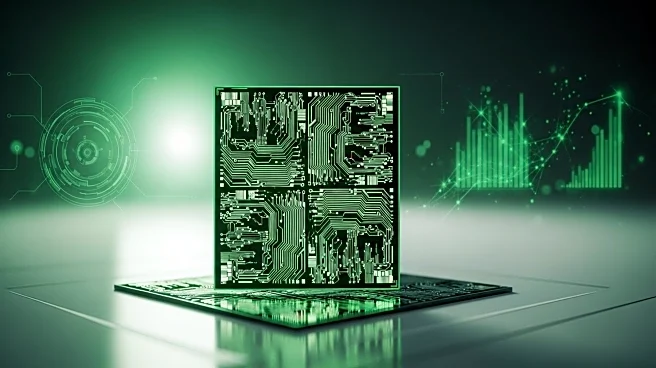What's Happening?
The semiconductor industry is undergoing a significant transformation towards sustainable manufacturing practices. This shift is driven by increasing environmental concerns, regulatory pressures, and the demand for corporate responsibility. Major companies like Taiwan Semiconductor Manufacturing Company (TSMC) and Intel are leading efforts to integrate renewable energy sources such as solar, wind, and green hydrogen into their operations. TSMC aims for full reliance on renewable energy by 2050, while Intel targets net-zero greenhouse gas emissions by 2040. The industry is also focusing on water conservation, with advanced reclamation systems reducing freshwater intake. Additionally, there is a push towards green chemistry, reducing hazardous materials, and adopting circular economy principles. These changes are essential as the demand for chips continues to rise, particularly with the growth of Artificial Intelligence (AI).
Why It's Important?
The move towards sustainability in the semiconductor industry has significant implications for the tech sector and the environment. As AI and other technologies demand more computational power, the energy consumption of data centers is increasing. Sustainable practices in chip manufacturing are crucial to mitigate this environmental impact. Companies that adopt these practices can gain competitive advantages, such as enhanced brand reputation and cost savings from energy-efficient processes. The shift also aligns with the growing consumer and investor demand for corporate responsibility. However, the transition involves high initial costs and technological challenges. Despite these hurdles, the commitment to sustainability is strong, driven by regulatory requirements and customer expectations.
What's Next?
In the coming years, the semiconductor industry is expected to accelerate its adoption of renewable energy and advanced water management systems. AI and machine learning will play a crucial role in optimizing manufacturing processes and reducing waste. Long-term developments may include deeper integration of circular economy principles and exploration of new materials and energy sources. The industry will need to address challenges such as high energy consumption and water scarcity. Collaboration across the ecosystem, including government initiatives and industry partnerships, will be essential to achieve sustainability goals. The focus on sustainable practices will continue to reshape the tech landscape, influencing investment and supply chain decisions.
Beyond the Headlines
The shift towards sustainable semiconductor manufacturing reflects a broader trend of integrating environmental responsibility into technological progress. This transformation is not just about compliance but represents a strategic imperative for the industry. It aligns with global climate goals and mirrors environmental milestones in other sectors. The focus on sustainability is reshaping competitive dynamics, driving innovation, and redefining market positioning. As the industry continues to evolve, sustainable practices will become a standard, influencing the development of AI, renewable energy infrastructure, and other technologies. The journey towards sustainability is complex but promises a more responsible and resilient tech ecosystem.








